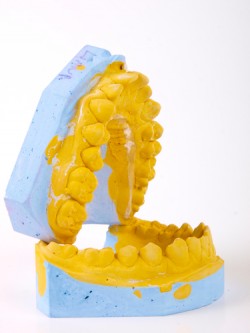Bite-mark expert's flip-flop is cited in death-row inmate's new appeal

Image from Shutterstock.
A Mississippi inmate on death row for two decades has filed a new appeal that claims he was convicted largely because of the kind of bite-mark evidence that has been cited in 24 wrongful convictions and indictments since 2000.
The inmate, Eddie Lee Howard Jr., was convicted in the murder and rape of an 84-year-old woman after a Mississippi dentist testified Howard’s bite matched that of bite marks on the woman’s body, examined after burial and exhumation, the New York Times reports. The Innocence Project filed the appeal, which also cited new testing that found none of Howard’s DNA at the crime scene or on the victim’s body.
Howard, who had a history of mental illness, did make incriminating statements, but he was unable to recognize the victim’s home and he said six other people were also involved in the crime, the Times says.
The expert in the case against Howard was Dr. Michael West, who told the ABA Journal in a 1996 article questioning his methods that time and science would eventually prove him right.
But in a 2012 deposition, West said he now believes bite-mark evidence is susceptible to error and should not be used in court, according to the Innocence Project brief (PDF). “I can no longer rely on bite marks as truth,” he said.
West told the Times in a telephone interview that he still stands by his testimony in Howard’s case, at least for now. “The evidence I collected, the analysis I performed, I still stand on that opinion unless new evidence is given to me,” he said.
See also:
ABA Journal (2008): “Bite-Mark Evidence Loses Teeth”



